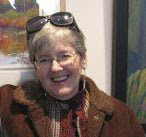The ancient rocking chair sways back and forth like an eccentric pendulum.
Three moppets catapult into the kitchen.
They’re followed by a frenetic puppy who skids into her food dish.
The room smells of freshly cut flowers and dog food.
Mom squats on the lurching chair appropriated by assorted tykes and the dog.
It’s time for “Curfew Must Not Ring Tonight!”
The tale of Bessie and her beloved, Basil Underwood, in Cromwell’s England is our favorite poem.
Well, it’s one of our favorite poems.
The dog squeals as her tail gets squeezed.
We all yell ‘hot dog! because we’re young and not too vociferous.
Little CC tells everybody what to do.
We shout in unison “Curfew must not ring tonight” after each stanza.
We love the sound of it sans meaning.
The multicolored feathers of strange words and flowing rhyme tickle our imaginations.
We’re as excited as crows waiting for trash pickup.
With Bessie we hang on to the large bell’s ringer to stop the sound.
If the big bell rings, Basil will be executed,
“Curfew must not ring tonight!”
Bessie stops the capricious bell.
Basil is pardoned.
The ponderous bell thinks “Omnia vincit amor.”
The old chair continues to rock.
Reference: Curfew Must Not Ring Tonight, published in 1870 by Rose Hartwick Thorpe (1850 – 1939), an American poet. This poem was one of Queen Victoria's favorites.


